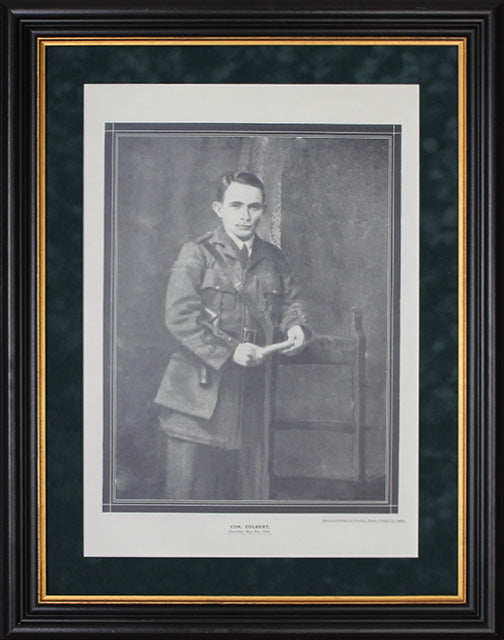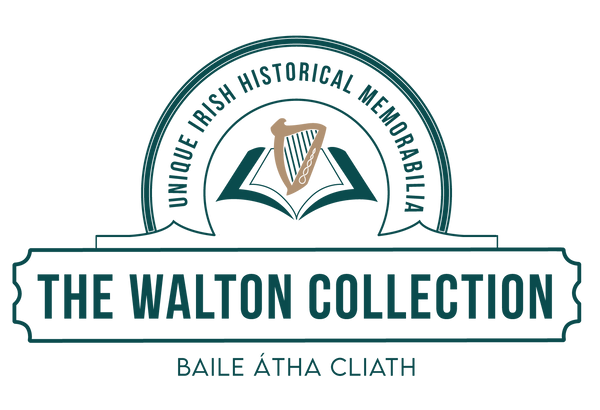The Walton Collection
Con Colbert - 1916 Poster
Con Colbert - 1916 Poster
Couldn't load pickup availability
Rare Cornelius Bernard Colbert 1916 commemorative poster. Con Colbert was born on the 19th October 1888 and was an Irish rebel and pioneer of Fianna Éireann. Following his involvement in the Easter Rising of 1916, he was executed by firing squad in Kilmainham Gaol, Dublin, on the 8th May 1916.
Born in the townland of Moanleana, Castlemahon, County Limerick, he was one of the thirteen children of farmer Michael Colbert and his wife Honora McDermott.
The large family moved to the village of Athea when Con was just three years old where he attended the local national school. His younger brother, James, and his cousin, Michael Colbert, would later serve as TDs in the Dáil.
At the age of 16 Con went to live with his sister Catherine in Ranelagh, County Dublin and continued his education at a Christian Brothers school in North Richmond street. He was subsequently employed as a clerk in the offices of Kennedy's Bakery in Dublin. In 1911, and two other siblings and two boarders were living at a house on in Rathmines. Colbert was very poiltically aware from a young age with both sides of his family having a history of nationalist and Fenian involvement. He was also keenly interest in local and national history.
Following his move to Dublin he joined the Gaelic League and attended Irish classes, lectures and the many cultural and social activities provided for members of the thriving organisation. He enrolled in Fianna Éireann, the scouting organisation for boys first established by Bulmer Hobson in 1903 and revived by Hobson and Countess Markievicz in 1909. He was a model member and he applied himself to gaining proficiency in its various activities and skills which included drill, marching, scouting, signalling, map-reading, first aid and the use of small arms. His diligence was soon acknowledged by his promotion to the captaincy of his branch and eventually to the Council.
Colbert was sworn into the IRB by his cousin Art O'Donnell in 1908.The following year he became a drill instructor at St. Enda's School, founded by Patrick Pearse. In 1912 he became head of an Irish Republican Brotherhood (IRB) circle. During 1913 he was one of a number of Fianna who conducted military training at the Forester's Hall in Rutland Square (now Parnell Square), and in November that year he joined the Provisional Committee of the newly formed Irish Volunteers.
In the weeks leading up to the Rising, he acted as bodyguard for Thomas Clarke. Before the Rising, because he lived out of the city he stayed with the Cooney family in the city centre. During Easter Week, he fought at Watkin's Brewery, Jameson's Distillery and Marrowbone Lane. Thomas MacDonagh at 3.15 p.m. Sunday, 30 April surrendered to Brigadier-General Lowe. MacDonagh then went around the garrisons under his command to arrange for their surrender. Colbert surrendered with the Marrowbone Lane Garrison along with the South Dublin Union Garrison, which had been led by Éamonn Ceannt.They were marched to Richmond Barracks, where Colbert would later be identified by G-men and court martialled. Colbert had made himself very prominent during the anti-recruiting campaign for the British Army that was then in full swing before the Rising. He wore kilts and frequently pulled down Union Jacks and recruiting posters and helped to break up meetings. He also drilled the Fianna in the open.
Transferred to Kilmainham Gaol, he was told on Sunday 7th of May that he was to be executed the following morning. He wrote more than than ten letters during his short time in prison. During this time, he would not allow any visits from his family and writing to his sister, he said a visit "would grieve us both too much". The night before his execution he sent for Mrs. Ó Murchadha who was also being held prisoner. He told her he was "proud to die for such a cause. I will be passing away at the dawning of the day." Holding his bible, he told her he was leaving it to his sister. He handed her three buttons from his volunteer uniform, telling her "They left me nothing else," before asking her when she heard the volleys of shots in the morning for Éamonn Ceannt, Michael Mallin and himself would she say a Hail Mary for the souls of the departed. The soldier who was guarding the prisoner in the cell during this visit began crying according to Mrs. Ó Murchadha, and recorded him saying "If only we could die such deaths". Colbert was shot by firing squad the next morning on the 8th May.
Originally printed and published by O'Loughlin, Murphy and Boland, (photo uncredited), the text below the photograph simply states: "CON. COLBERT , Executed, May 8th, , 1916". The original print in the collection was in a poor condition and has been digitally repaired. This is a fine reproduction on 210 gsm satin art paper, beautifully mounted on a mottled green suede background and set behind glass in a handmade, aged dark mahogany finish frame with a gold gilt sightline.


